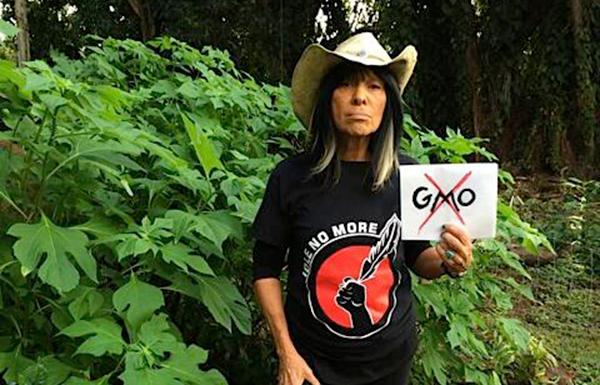For decades, Buffy Sainte-Marie has been an artistic trailblazer. The Sixties folk explosion saw the Canadian-born Cree songwriter confront the colonial status quo with hit songs like “Bury My Heart at Wounded Knee” as well as the anti-war anthem “Universal Soldier.” Sainte-Marie, who is currently based in Hawaii, is gearing up to record her first album of new material since 2008 (more on that later), and took a few minutes to share her thoughts on a number of topics with ICTMN.
We’ve seen your Tweets (@BuffySteMarie) about the oil sands, or tar sands as they’re sometimes called — what’s your take on the situation?
Almost a year ago I went to Fort McMurray (Alberta) and I was just devastated with what’s going on there. Just devastated. I just told everybody I could: “You’ve got to take this seriously.” Even since I was there, other people have really stepped forward in their own ways, Neil Young in particular. He’s caught a lot of criticism because he didn’t involve me, Susan Aglukark or other Native people. Neil came to the induction ceremony in Nashville, at the Musicians Hall of Fame, and I told him I’d seen some of the criticism and not to listen to it at all! Because it’s so important, it has to be everybody doing whatever they can, whenever they can, and being effective at whatever level they can be. You reach people your way, I do it my way and Neil does it his way. But people have to see it.
RELATED: Neil Young: Blood of First Nations People Is on Canada’s Hands
It’s really worth a trip to Fort McMurray just to see it with your own eyes. If you really want to see something historic in your life, go to Fort McMurray and just bear witness to what they’re doing. It’s never going to return, and this is the future of the planet if the present people are allowed to stay in charge. We are allowing them to stay in charge. We are allowing it. That’s why we have wars. We have to be really vigilant and supportive of one another, because it has to stop. There’s no turning back.
Neil Young toured with the First Nation that’s experiencing high cancer rates from the tar sands. And yet he also caught criticism when people said, “Oh, he’s just an outsider, he lives in California — what right does he have to criticize this?”
(Laughs). Because it’s not only about Canada, that’s why! Good for Neil for stepping up. Everybody should be stepping up at whatever their most effective level is. It’s not just about Native people and it’s not just about Canada. Just the weather changes are indicative: people just gotta wake up.
Have the issues changed over time, or is it still the same root issues as in your songs “Bury My Heart at Wounded Knee” or “Universal Soldier”?
The root issue is always the same. It’s about corporate greed in charge of all of our energy. That’s the root issue. But in the 1500s it was gold and silver in Central America, and then coal, oil, and now uranium. I have a song that’s going to be on the album I’m recording now called “The Uranium War.” It has a line:
Coal and oil and hey, now uranium
Keep the Indians under your thumb
Pray like hell when your bad times come
Get ’em up, rip ’em up, strip ’em up
Get ’em with a gun.
So the violence that occurs, and has been occurring against Indigenous People in the world because of resources has now become obvious to the non-indigenous people too. There are now more people understanding how devastating the misuse of resources not only can be, but just plain is.
Let’s talk about the Longest Walk. Richie Havens passed on last year, and you were a long supporter of the Longest Walk and affirming treaty rights. Could you offer some thoughts on him, his passing and his legacy?
He and I kind of emerged around the same time — the summer of 1963-4. We would see each other over the years. He came and visited me in Hawaii a few times. We were good friends. He was such an incredible interpreter of other people’s songs, and such a good guy. Pete Seeger too — he just did so much for the world through music, in ways both subtle and big. You know, heaven must be a great place, because there’s a lot of people going there!

You were with Pete Seeger at Clearwater Fest last summer. The photos were just beautiful, you guys having a lovely hug.
He was just really, really special, huh?
Do you ever feel nostalgic for that era, when you all emerged almost at once? It must have been such a different energy because it was also a social movement as well as being about music.
It was, but I’ve been waiting for it to come back. And I think it has. For me, the Internet is like the Sixties. It used to be, in the Sixties, all kinds of music was available to you, but it was kept away. You had to go with this label and that genre. It really became a very narrow-minded corporate world. They’d sign 90 artists and shelve 90 others. It used to be so unfair. But now you can hear all kinds of music, and everybody can get played, publish a song, or share things on the Internet. It’s such a wonderful time that we’re living in. You shouldn’t discount it or think that the Sixties were better. The Sixties were about a true student movement. And now there’s another true populist movement, so let’s do what we can, while we can.
To learn more about Buffy Sainte-Marie, visit her official site BuffySainte-Marie.com.
Read more at http://indiancountrytodaymedianetwork.com/2014/03/19/buffy-sainte-marie-tar-sands-youve-got-take-seriously-154085?page=0%2C1

